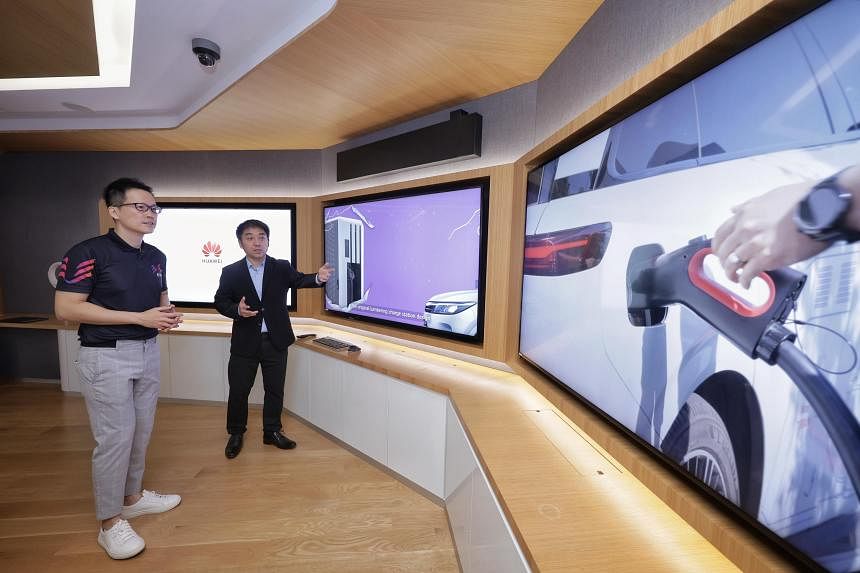SINGAPORE - Ultra-fast chargers that can fully charge an electric vehicle (EV) within 30 minutes are slated to be installed in Singapore by the end of 2024.
EV-electric (EVe), a subsidiary of the Land Transport Authority, signed an agreement with Chinese technology giant Huawei on March 18 to bring in such chargers, which are touted to be the fastest in South-east Asia.
These chargers are meant to serve EV users such as taxi and delivery drivers who drive a lot and need to recharge their vehicles more frequently and quickly than private EV drivers.
It takes up to eight hours to charge an EV at standard charging points installed in Housing Board carparks.
The ultra-fast chargers have a maximum charging speed that is higher than what the current generation of EVs can handle, but EVe expects models arriving in the next few years to be able to maximise the charging capabilities.
Under the agreement, EVe and Huawei will also use solar panels and battery energy storage systems to power the chargers, and thus reduce the load on the electricity grid.
The roll-out of Singapore’s public EV charging network is coordinated by EVe. There are currently five operators covering different parts of Singapore.
EVe chief executive Derek Tan told The Straits Times that details like how many of the ultra-fast chargers will be brought in and where these will be located are still being discussed, but “one to two” chargers will be ready by the end of 2024.
Each charger will have two charging nozzles to serve two vehicles at a time.
On where the chargers will be installed, Mr Tan said the selected sites must have sufficient electricity to power them, as EVe wants to avoid incurring expensive and complex upgrades to charging infrastructure.
At least one of the locations being considered will be able to accommodate bigger EVs like minibuses, he added.
It will be up to the charging service operators to negotiate terms like the price of the charger with Huawei and put the chargers into operation.
Neither EVe nor Huawei gave an estimate on how much it will cost to install the ultra-fast chargers when asked.
When Huawei unveiled the ultra-fast charger in 2023, the tech giant claimed it was able to deliver enough charge in five minutes to add 200km of operating range.
By 2024, the company wants to have 100,000 charging stations with such chargers across more than 340 cities and major highways in China.
Huawei said the charger is able to deliver electricity to the EV batteries so quickly because it uses liquid cooling, which is more effective in bringing down operating temperatures than the fans that are commonly used on many EV chargers. High temperature limits how fast a battery can be charged.
The charger that will be launched in Singapore is a slightly tuned-down version of the one in China, being rated at 480 kilowatts instead of 600kW.
This is to comply with the current ceiling under the latest national EV charging standard in Singapore, which was raised to 500kW in 2022 from 200kW. The kilowatt measurement refers to the charger’s speed.
The Huawei chargers will be among the 120 fast chargers to be installed at around 60 HDB carparks, including in Boon Lay, Redhill, Kallang Bahru, Tampines and Woodlands.
As at March 18, there are 2,984 publicly accessible EV chargers.
Logistics company Ninja Van Singapore has more than 10 electric vans in its fleet that are charged at commercial or residential carparks.
“Depending on the drivers, some prefer charging overnight to get it to a full charge while some prefer to go to fast charging stations,” said the company’s spokeswoman, adding that having more charging options with different speeds will definitely help its drivers.


